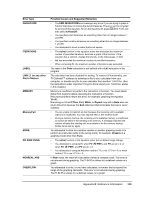Texas Instruments TI-84 PLUS SILV Guidebook - Page 401
Appendix B: Reference Information, Left Bound > Right Bound
 |
View all Texas Instruments TI-84 PLUS SILV manuals
Add to My Manuals
Save this manual to your list of manuals |
Page 401 highlights
Error Conditions When the TI-84 Plus detects an error, it returns an error message as a menu title, such as ERR:SYNTAX or ERR:DOMAIN. This table contains each error type, possible causes, and suggestions for correction. The error types listed in this table are each preceded by ERR: on your graphing calculator display. For example, you will see ERR:ARCHIVED as a menu title when your graphing calculator detects an ARCHIVED error type. Error Type ARCHIVED ARCHIVE FULL ARGUMENT BAD ADDRESS BAD GUESS BOUND BREAK DATA TYPE DIM MISMATCH Possible Causes and Suggested Remedies You have attempted to use, edit, or delete an archived variable. For example, the expression dim(L1) produces an error if L1 is archived. You have attempted to archive a variable and there is not enough space in archive to receive it. A function or instruction does not have the correct number of arguments. See Appendix A for function and instruction syntax. Appendix A displays the arguments and punctuation needed to execute the function or instruction. For example, stdDev(list[,freqlist]) is a function of the TI-84 Plus. The arguments are shown in italics. The arguments in brackets are optional and you need not type them. You must also be sure to separate multiple arguments with a comma (,). For example, stdDev(list[,freqlist]) might be entered as stdDev(L1) or stdDev(L1,L2) since the frequency list or freqlist is optional. You have attempted to send or receive an application and an error (e.g. electrical interference) has occurred in the transmission. • In a CALC operation, you specified a Guess that is not between Left Bound and Right Bound. • For the solve( function or the equation solver, you specified a guess that is not between lower and upper. • Your guess and several points around it are undefined. Examine a graph of the function. If the equation has a solution, change the bounds and/or the initial guess. • In a CALC operation or with Select(, you defined Left Bound > Right Bound. • In fMin(, fMax(, solve(, or the equation solver, you entered lower , upper. You pressed the É key to break execution of a program, to halt a DRAW instruction, or to stop evaluation of an expression. You entered a value or variable that is the wrong data type. • For a function (including implied multiplication) or an instruction, you entered an argument that is an invalid data type, such as a complex number where a real number is required. See Appendix A and the appropriate chapter. • In an editor, you entered a type that is not allowed, such as a matrix entered as an element in the stat list editor. See the appropriate chapter. • You attempted to store an incorrect data type, such as a matrix, to a list. Your calculator displays the ERR:DIM MISMATCH error if you are trying to perform an operation that references one or more lists or matrices whose dimensions do not match. For example, multiplying L1*L2, where L1={1,2,3,4,5} and L2={1,2} produces an ERR:DIM MISMATCH error because the number of elements in L1 and L2 do not match. Appendix B: Reference Information 394















